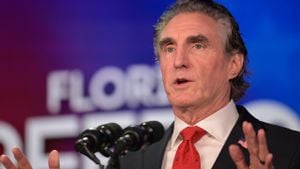German Chancellor Olaf Scholz has recently engaged Vladimir Putin over the phone, marking the first direct communication between the two leaders since December 2022. The conversation is particularly noteworthy as it highlights the continued tensions between Germany and Russia amid the prolonged Ukraine war. Scholz’s office emphasized the necessity of dialogue to ease the standoff and reiterated Germany's commitment to supporting Ukraine against Russian aggression.
According to reports, the call lasted approximately one hour and covered various topics, including the need for peace and security in Europe. Scholz has often emphasized the importance of maintaining communication with Moscow, even though the relationship has been strained since the onset of the Ukraine conflict. His administration has backed Ukraine with financial and military aid, but Scholz believes sporadic dialogues could pave the way for future solutions.
The Chancellor’s approach has drawn some criticism domestically, with opposition parties questioning the effectiveness of engaging with Putin, who is accused of leading Russia's invasion of Ukraine. Scholz defended his stance, asserting, "Diplomacy is key to any peaceful resolution." The situation facing Germany and its leaders renders the act of communicating with the Kremlin both contentious and necessary.
Putin, for his part, has maintained a defiant posture. Official Russian reports suggested the conversation was cordial but reiterated Russia's unwavering stance on its military objectives. The Kremlin spokesperson remarked, "Russia’s military maneuvers are conducted to secure the interests of our nation, and discussions alone will not sway our strategic plans." This sentiment reflects the broader dynamics at play, with each side jostling for influence and credibility on the global stage.
After the call, Scholz conveyed his intent to strengthen support for Ukraine. He mentioned possible additional military assistance as Germany continues to assess its role within NATO and its obligations to its Eastern European allies. "We cannot let up now; the stakes for Europe are higher than ever," he stated during a press briefing.
Reactions following the call have varied widely. Many European leaders have expressed cautious optimism about any dialogue with Russia but remain skeptical about its consequences. While some believe communication might lead to easing tensions, others feel diplomatic gestures are futile against the backdrop of aggressive military actions.
Scholz’s call also caught the attention of the United States, where officials reiterated their endorsement of Germany's support for Ukraine. President Biden lauded Scholz’s approach, describing it as “an important step” toward advocating for peace, though some within Washington argue it risks emboldening Putin's resolve.
Following the call, European markets reacted mildly, illustrating investors' divided sentiments on geopolitical stability. Analysts pointed out the delicate balance leaders like Scholz must maintain as they assess their nation’s foreign policy and economic interests juxtaposed with the realities of war.
Among the calls from various political factions within Germany, leaders from the far-right AFD (Alternative for Germany) party criticized Scholz for engaging with Putin, branding it as dangerous and ineffective. The AFD’s position reflects the growing nationalist sentiment across some European circles, which oftentimes blatantly opposes compromises with Russia. Conversely, leftist factions argue for the necessity of dialogue as part of larger humanitarian efforts.
The recent conversation could also influence future discussions within NATO, particularly as member states grapple with their response timelines to Russian military provocations. The organization’s next summit is positioned to address the prospective expansions of military forces stationed near Russia’s borders, along with mutual defense policies.
Looking forward, Scholz intends to engage with allies such as French President Emmanuel Macron and British Prime Minister Rishi Sunak to consolidate strategies toward Russia and bolster support for Ukraine. The European Union is also set to convene to reconsider sanctions and aid packages, reflecting the continuous adjustments to the conflict.
Scholz’s communication with Putin is pivotal, not just as another chapter of Germany's foreign policy but as part of the broader narrative of Europe’s engagement with Russia. The complexity of these relationships, tied closely to issues of security, sovereignty, and moral responsibility, will influence how peace initiatives are structured moving forward.
Public sentiment within Germany has mirrored the divisions observed at the political level. Many citizens support rigorous measures against Russia and endorse aid for Ukraine, but there’s also anxiety about the ramifications of prolonged conflict, both economically and socially.
This delicate situation continues to evolve, and as world leaders navigate these turbulent waters, the necessity and effectiveness of channels for communication remain hotly debated. Scholz's recent phone call, albeit significant, is just one thread of the vast, interconnected web of geopolitics at play.



